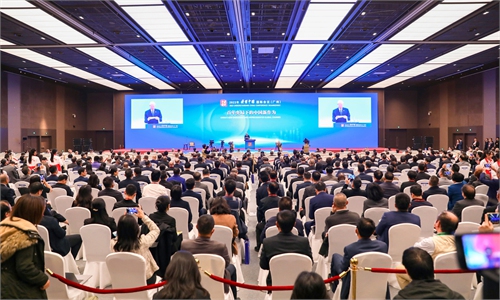'Chineseness' enables China to shape a just, equitable international order

As for world order, Chinese civilization is featured by its secular culture and the absence of a geopolitical consciousness like that of the US and some other major powers. The two features make China more capable of shaping a just and equitable world order as opposed to religious civilizations or major powers with geopolitical cultures.
China is a secular country, and it is not burdened by religion. China's greatest educator, Confucius, solved the problem of religion in a single sentence. He said, "Respect ghosts and spirits, but keep them at a distance." In his view, religious belief is a personal matter which should not be brought into the area of national governance. In other words, in Chinese culture there is no scenario where one has to choose between different gods in public affairs. So when the US asks China to choose one religion over another, China always says "no." Moreover, China is much less likely to appeal to a God to solve real problems, as it has never done so in the past.
In terms of secular interests, China does not have the geopolitical culture that some other major powers have. China often insists that its culture is one of peace and that the Chinese are peace-loving. Although the West does not believe this on the basis of its own logic, and often imposes its own logic on China, the empirical evidence points to the peaceful nature of Chinese culture.
An example often cited by Mahathir Mohamad during his tenure as Prime Minister of Malaysia is: "We have traded with China for nearly two thousand years. But China never conquered us. We have relations with Europe. The Portuguese came to Malaysia in 1509. Two years later, they came and conquered us." Despite the fact that the US and some Western countries always harp on the prediction that China is going to conquer Asia as it rises, experience and history tell us that a rising China has no geopolitical ambitions toward Asian countries, except for resolutely defending its core interests. The process of China's rise is also the process of Asia's peaceful development. China has risen according to the logic of its own civilization, not the logic of the West.
It is precisely because China has no geopolitical ambitions that it does not need to choose between different geopolitical blocs. In the field of geopolitics, China will not create insecurity for other countries by pursuing its own absolute security as the US does. In Chinese culture, security is always relative, and the absolute security of one country always leads to the absolute insecurity of another.
It is because of these qualities that China can transcend religion and geopolitical interests and be fair and just in dealing with international affairs. China's success in reconciling Saudi Arabia and Iran is due to the fact that these two formerly hostile forces recognize China's fairness. Although the US has also tried to bring peace to the Middle East, it has used force deterrence and the usual "divide and conquer" strategy.
Certainly, the US played a major role in the provision of international public goods after World War II. However, the US' approach has become unsustainable. Although the US is also adjusting its international strategy, it is mainly directed against China. It can be expected that if this general direction does not change, there will be an increasing scarcity of good international public goods and an increasing number of bad international public goods. If that happens, then international chaos is almost inevitable. But if China and the US can cooperate, the world will be totally capable of providing superior international public goods and reducing bad international public goods.
In the face of global disorder, China should play a significant role. Although the US defines the relationship with China as "strategic competition," China is still striving for cooperation with the US, as Chinese President Xi Jinping's trip to San Francisco has shown. At the same time, because China-US relations are not the entirety of China's foreign relations, China is also promoting all other aspects of diplomatic relations through inclusive multilateralism.
In short, if we think about China's international positioning from the perspective of supplying international public goods, we will find out how to get along with Asia, the US and the world, and how to reshape the international order on the basis of our own sustainable development.
The author is a professor at the Chinese University of Hong Kong, Shenzhen and president of The Institute for International Affairs, Qianhai. opinion@globaltimes.com.cn

Illustration: Liu Rui/ GT
Asia today faces unprecedented security challenges, and the situation in Asia needs to be understood from the perspective of overall international relations. China should think out of the box and consider what it can do for the world. I would like to discuss China's unique role in world order from the perspective of "Chineseness."As for world order, Chinese civilization is featured by its secular culture and the absence of a geopolitical consciousness like that of the US and some other major powers. The two features make China more capable of shaping a just and equitable world order as opposed to religious civilizations or major powers with geopolitical cultures.
China is a secular country, and it is not burdened by religion. China's greatest educator, Confucius, solved the problem of religion in a single sentence. He said, "Respect ghosts and spirits, but keep them at a distance." In his view, religious belief is a personal matter which should not be brought into the area of national governance. In other words, in Chinese culture there is no scenario where one has to choose between different gods in public affairs. So when the US asks China to choose one religion over another, China always says "no." Moreover, China is much less likely to appeal to a God to solve real problems, as it has never done so in the past.
In terms of secular interests, China does not have the geopolitical culture that some other major powers have. China often insists that its culture is one of peace and that the Chinese are peace-loving. Although the West does not believe this on the basis of its own logic, and often imposes its own logic on China, the empirical evidence points to the peaceful nature of Chinese culture.
An example often cited by Mahathir Mohamad during his tenure as Prime Minister of Malaysia is: "We have traded with China for nearly two thousand years. But China never conquered us. We have relations with Europe. The Portuguese came to Malaysia in 1509. Two years later, they came and conquered us." Despite the fact that the US and some Western countries always harp on the prediction that China is going to conquer Asia as it rises, experience and history tell us that a rising China has no geopolitical ambitions toward Asian countries, except for resolutely defending its core interests. The process of China's rise is also the process of Asia's peaceful development. China has risen according to the logic of its own civilization, not the logic of the West.
It is precisely because China has no geopolitical ambitions that it does not need to choose between different geopolitical blocs. In the field of geopolitics, China will not create insecurity for other countries by pursuing its own absolute security as the US does. In Chinese culture, security is always relative, and the absolute security of one country always leads to the absolute insecurity of another.
It is because of these qualities that China can transcend religion and geopolitical interests and be fair and just in dealing with international affairs. China's success in reconciling Saudi Arabia and Iran is due to the fact that these two formerly hostile forces recognize China's fairness. Although the US has also tried to bring peace to the Middle East, it has used force deterrence and the usual "divide and conquer" strategy.
Certainly, the US played a major role in the provision of international public goods after World War II. However, the US' approach has become unsustainable. Although the US is also adjusting its international strategy, it is mainly directed against China. It can be expected that if this general direction does not change, there will be an increasing scarcity of good international public goods and an increasing number of bad international public goods. If that happens, then international chaos is almost inevitable. But if China and the US can cooperate, the world will be totally capable of providing superior international public goods and reducing bad international public goods.
In the face of global disorder, China should play a significant role. Although the US defines the relationship with China as "strategic competition," China is still striving for cooperation with the US, as Chinese President Xi Jinping's trip to San Francisco has shown. At the same time, because China-US relations are not the entirety of China's foreign relations, China is also promoting all other aspects of diplomatic relations through inclusive multilateralism.
In short, if we think about China's international positioning from the perspective of supplying international public goods, we will find out how to get along with Asia, the US and the world, and how to reshape the international order on the basis of our own sustainable development.
The author is a professor at the Chinese University of Hong Kong, Shenzhen and president of The Institute for International Affairs, Qianhai. opinion@globaltimes.com.cn



